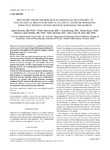Recovery from neurological sequelae secondary to oncological brain surgery in an adult growth hormone-deficient patient after growth hormone treatment

Use this link to cite
http://hdl.handle.net/2183/15886Collections
- Investigación (FFISIO) [481]
Metadata
Show full item recordTitle
Recovery from neurological sequelae secondary to oncological brain surgery in an adult growth hormone-deficient patient after growth hormone treatmentAuthor(s)
Date
2009Citation
Devesa J, Reimunde P, devesa A, et al. Recovery from neurological sequelae secondary to oncological brain surgery in an adult growth hormone-deficient patient after growth hormone treatment. J Rehabil Med.2009;41(9):775-7
Abstract
[Abstract] Objective: To report an unusual case of significant neurological recovery in a 26-year-old growth hormone-deficient female patient with significant neurological sequelae resulting from brain surgery at 11 years of age. Design: Case report. Results: Most of the neurological sequelae present at admission recovered after 8 months of combined growth hormone administration and kinesitherapy/speech therapy. These include an increase in tongue size and mobility and in the amount and quality of saliva, improvement in vocal cords function, recovery of oesophageal peristalsis and disappearance of sleep apnoea. Conclusion: Since the patient had undergone intensive physical rehabilitation for a 15-year period with no significant improvement, it is tempting to speculate that the correction of growth hormone deficiency improved her rehabilitation. Therefore, we propose that growth hormone treatment, combined with the adequate kinesitherapy, may be a useful therapy for effective recovery from some neurological deficits in patients with growth hormone deficiency.
Keywords
Cranial nerve injuries
Growth hormone
Vocal cord paralysis
Growth hormone
Vocal cord paralysis





